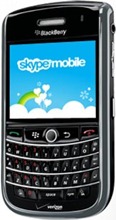Verizon Wireless and Skype announced at Mobile World Congress that they would be teaming together to offer Skype on many Verizon Wireless smart phones.  I use both Verizon Wireless and Skype. Verizon Wireless has a very reliable network. Skype is a great application. Starting in March, I will be able to run Skype on my Blackberry. I will save me time and money.
I use both Verizon Wireless and Skype. Verizon Wireless has a very reliable network. Skype is a great application. Starting in March, I will be able to run Skype on my Blackberry. I will save me time and money.
I use Skype most often for international communications. It works and is easy to use. I find Skype to be a bit ahead of its competition with new features. They do a good job of presenting a simple interface that you can use for voice, IM, or video conferencing. In Enterprise technology we call it UC, which stands for Unified Communications. Skype does that, and it does it pretty well. It has presence, so that you can see when people are available. If they aren’t, you can leave messages that the person will get later.
I used Skype while my son was travelling across Europe last summer. He was staying in different hostels in different countries and was “playing it by ear”. Skype allowed him to stay in touch. As a parent, it was a joy to see his face and let him see everyone (even the dogs) at home.
Here is how I understand the partnership. Skype calls will be carried over the Verizon Wireless voice network, not the data network. That makes sense to me. The Verizon Wireless network is already optimized for voice service. The calls will be converted over to Skype VoIP when they leave the Verizon Wireless network in order to travel across the public internet. So now, if you are talking to someone on Skype, they don’t count as minutes on your Verizon Wireless plan. If you want to jump off the Skype network, you can use Skype Out to call international phones at their rates.
 The Skype application will be available to the BlackBerry Storm 9530, Storm2 9550, Curve 8530, Curve 8330, and BlackBerry 8830 World Edition; and the Motorola Droid and Devour; and the HTC Eris.
The Skype application will be available to the BlackBerry Storm 9530, Storm2 9550, Curve 8530, Curve 8330, and BlackBerry 8830 World Edition; and the Motorola Droid and Devour; and the HTC Eris.
Industry reaction to the announcement has been interesting. Quite a few people have focused on the “changing of the guard” from wireless to VoIP. Others have focused on telco vs. internet types of competition. Still others focused on who got the better end of the deal. Given that all of these dynamics were at work, what was most interesting to me was the fact that Skype and Verizon were able to successfully negotiate an agreement that added value to their consumers and to each other. It isn’t easy.
I look at the Verizon Wireless / Skype partnership as basically adding their networks to each other’s to create a more powerful network for all of their users. Given today’s technical, business, and regulatory environments, both companies should be recognized for taking a step forward for their users.

Discussion
Comments are disallowed for this post.